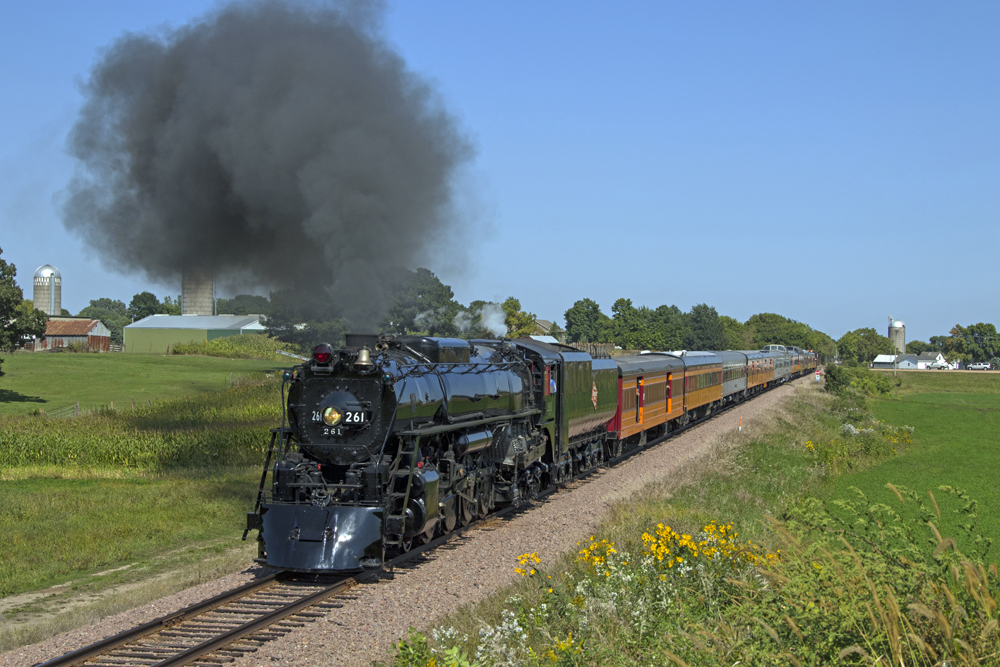The Man In Black himself, posed with NC&StL #576 in 1969

Another big piece of news is that the Friends of Milwaukee Road #261 are looking at converting it from burning coal to oil, with Ed Dickens, head of the UP steam program and the guy responsible for converting Big Boy #4014 from coal to oil, consulting on the project. Oil is easier to transport and load, has less chance of wildfires and burns cleaner, and is currently cheaper than the grade of coal a steam locomotive requires. There is a historical precedent as well, because while all the S-3 Northerns were delivered as coal-burning, but coal mine strikes and the Korean War brought an acute motive power shortage to the railroad as traffic boomed. In 1950, S-3s Nos. 262, 263, 267 and 269 were converted to burn oil and moved to the Idaho Division “gap” in Milwaukee Road’s electrified operations between Avery, Idaho and Othello, Wash.

The Wiscasset, Waterville & Farmington has also announced that this summer they will begin construction of a 3-stall roundhouse based off the original roundhouse. This will give them room to house #9, #10 when it's boiler work is done, and #11 when it is constructed. Also, for the time being it can house Monsen #4 and Bridgton & Saco River #7 or #8 while they are visiting from the Maine Narrow Gauge Museum.




During a 1984 excursion with SP #4449, Doyle McCormack noticed the engine start accelerating quite rapidly. They took a look back and #4449 had separated from the tender and train. The retention plate for the drawbar pin had fallen off, and then the drawbar pin worked loose and the drawbar came free. They ended up finding the parts along the roadbed and reassembling it, and since then have always checked that component with extra attention

Also, the back of an SP GS-4 cab is weird looking without a tender. Since they were an oil burner, the fireman really didn't need access to the tender, but its still strange to see a flat wall with no opening. It almost looks like an overgrown tank engine
In reply to NickD :
I had no idea there were any steam engines with fully-enclosed cabs, but it must have been welcome for any operating in cold northern winters.
In reply to Pete Gossett (Forum Supporter) :
Steam engines are one of those things that are hotter than hell in the summer, and extremely cold in the winter. Canadian steam engines had what were called "All-weather" cabs. The can was joined to the tender with a vestibule, they had closeable doors where you climbed up, and there was a canvas sheet at the back where the fireman went out into the tender. Northern Pacific, Great Northern, Duluth, Missabe & Iron Range used them sporadically but they never really caught on in the US.
In reply to NickD :
Those are interesting. I'm sure it's the perspective, but they still look wide open between the back of the cab & front of the tender?
In reply to Pete Gossett (Forum Supporter) :
There's a vestibule like between passenger cars hooking the back of the cab to the coal bunker. Its narrower than the back of the cab, so you can't really see it. There wasn't a door but they had a canvas curtain that did an okay job of keeping the heat in.
Its weird that they didn't really take off in other areas. New York Central ran in plenty of cold weather areas and wasn't one of those lines that ordered cheap, stripped-down engines, but didn't go for all-weather cabs (although P&LE retrofitted some H-10b Mikes they bought of NYC). And I'm pretty sure the New England lines passed on them too.
Colebrookdale Railroad in Boyerstown, Pennsylvania announced a month or so ago that they are purchasing Grand Trunk Western J-3-a Pacific #5030 off the city of Jackson, Michigan to restore to operation. There was some hurt feelings in Jackson, since some people are mad that the city is selling off a piece of its history and multiple groups had offered to cosmetically fix up the engine and had been turned away by the city. But, it'll be nice to see the engine be operating again. GTW #5030 also has some interesting, albeit sad, history behind it in that it was hauling a special trainload of Knights Templar to a Masonic convention when it derailed due to excessive speed and poor track condition. Four people, including the engineer and fireman, were killed and 32 passengers injured. The locomotive was repaired and put back into service after the so-called "Knights Templar Disaster".


Then this weekend, Colebrookdale also announced that they have purchased Lake Superior & Ishpeming 2-8-0 #18, formerly of Iowa Pacific Holding's San Luis & Rio Grande, and will be having it moved to the line. I'm going to guess that since #18 still has time on her 1472 and is an operating engine, they will use it as a stopgap until the restoration of #5030 is complete. One weird thing is that #18 was converted to oil-burning at Grand Canyon Railway, and GTW #5040 is a coal-burning engine. I'm curious is they are going to convert #5030 to oil burning or keep both fuel sources on hand (I guess they could convert #18 back to coal-burning but that seems like more effort than its worth)

So now Pennsylvania is getting two more operational large steam locomotives, while New York's count remains at, uhhh, let me check, oh right, zero. The home of the New York Central and American Locomotive Works has zero operational large steam engines. There are two 15" gauge Crown park locomotives and a privately owned and operated 0-4-0 saddle tanker from American Viscose and that's it. Arcade & Attica was the last place in NY operating large steam locomotives, with a former Boyne City 2-8-0 and an Escanaba & Lake Superior 4-6-0, and both of those have been long out of service with boiler troubles. The Railway Historical Society of Northern New York also had an operational Shay that they spent a bunch of money restoring only for it to be taken out of service by a cracked crankshaft, boiler issues and noncompliant air brakes. Even most of the display locomotives are 0-4-0s and 0-6-0s. The only noteworthy exceptions are the PRR I1s 2-10-0 at Hamburg, NY, a privately owned and very rough Canadian Pacific Mikado tucked away at Gould Coupler in Depew that was nearly scrapped a few years ago, and the Long Island Rail Road G5 4-6-0 down at Oyster Bay that is disassembled.
New York seems fairly hostile to excursion lines in general, at least from what I've seen. Based on that I'm not surprised there aren't any operational steam engines in the state.
02Pilot said:New York seems fairly hostile to excursion lines in general, at least from what I've seen.
Understatement of the century, after they forced the Adirondack Scenic Railroad to tear up 34 miles of their track so that they could make more snowmobile trails in an area already littered with hundreds of miles of snowmobile trails. Even worse when the railroad won the lawsuit the first time around, and then the state just kept changing the rules and definitions until they won. They had a link where you could submit comments on the situation but the link was broken, so you couldn't email saying you were in favor. I've talked to people who went to the few open meetings they had about the plan (most of them were held behind closed doors) and they said if you tried to speak in support of the railroad, you were just talked over and shouted down. The second the state put forth that plan, the decision was already made, it was just a matter of how long it would take them to win. It was a real giveaway when the railroad said, since they didn't run trains to Lake Placid in the winter, the snowmobiles could just ride on the right of way and the state refused to accept that deal.
The Class 1s in New York aren't much better. Norfolk Southern has trackage in New York and allows steam trips with #611 and #4501 and NKP #765 on their rails but they always run those down in Virginia, Tennessee and Georgia, never in the north. Canadian Pacific is a hard no, ever since Hunter Harrison was president. And CSX isn't any better. I mean, this is the railroad that when they are selling off branch lines and trackage they include a clause that the purchaser will not operate steam locomotives or vintage equipment on it under threat of legal action. Some predict a softening of CSX's attitudes with C&O #2716 and NC&StL #576, but I doubt they'll ever run those up in New York.
In addition to the two engines at Arcade & Attica and the Shay up to Croghan, there were two other stillborn attempts to restore and operate a steam engine. When the first Adirondack Railway was formed in '79, the man in charge dragged DL&W 2-6-0 #565 up from New Jersey with plans to have it restored at Rome Locomotive Works and operate it on the line. The railway went bankrupt in '81 and poor #565 was never restored to operation, instead having more of its parts scattered to the wind. Then, Canadian Pacific 4-6-0 #453 was purchased by O. Winston Link and towed up to Rome Locomotive Works from New Jersey and was undergoing an operational restoration. I believe the plan, again, was to run it on the new Adirondack Scenic Railroad.

But O. Winston Link's wife was fooling around with the owner of Rome Locomotive Works, so he cancelled the restoration (Rome Locomotive Works also went bankrupt around the same time) and it sat in Utica outside a hobby shop for years, before a private owner bought it and it disappeared to parts unknown. Adirondack Scenic Railroad would still be a terrific place to run a steam locomotive, but they are a bit too busy fighting to stay in business now to embark in that direction.
I looked at donating some money to the Arcade & Attica for fixing up one of their steam locomotives, but the only way to donate is to send a check in the mail. C'mon, in the year 2021, there is no reason to not have a PayPal or GoFundMe. Hell, WW&F does a ton of their donations and fundraising via Facebook.
So it looks like I'll be taking my son to the NYC Museum in Elkhart tomorrow. Anyone need extremely low quality pics of anything? Don't think the Mrs. is going, so you won't get any quality photography, but I'm happy to snap a cell phone "potato pic" here and there if you want me to.
In reply to kazoospec :
I get that Elkhart was a major hub for the New York Central, but I still don't get why the New York Central Museum isn't in, you know, New York. Guess it comes down to the above discussion, where New York clearly isn't concerned about that sort of history.
Sixty four years ago today, on March 29, 1957, the NY Ontario & Western Railroad ceased all operations after its final run between Oswego and Norwich. On that day, EMD FT No.805 departed Oswego, headed south through Fulton, skirting the north side of Oneida Lake, sounding one last blow of its whistle through villages and hamlets such as Central Square, Jewell, Constantia, North Bay, Sylvan Beach, Sylvan Junction, where it crossed over the Barge Canal, passing Fish Creek Station, through State Bridge where it crossed over Route 46 and the Erie Canal via Bridge no. 361 into Durhamville, beneath the NYS Thruway and not long after, the old New York Central mainline, and into the Oneida yard as seen in the photo below. At Oneida, the final train order was given to run Engine No. 116, an NW2 switcher, extra to Norwich. At Oneida, the switcher was added to the fleet of cars in front of the caboose. As it left the Oneida yard, it passed beneath the West Shore overpass, across route 5, through Kenwood, over the Kenwood trestle and continued on south through Munnsville, Hamilton, Earlville, until reaching its final destination at Norwich, putting an end to 89 years of service

An NYO&W NW2 at Middletown on March 29th, 1957. The final day of operation. Several of the NW2s and GE 44-tonners survive, but all the steam engines, EMD FTs and F3s are gone. A passenger car was saved here and there. All the freight cars were in too poor of condition to interchange so they were cut up on the spot.

In reply to Pete Gossett (Forum Supporter) :
It was an accident in Thistle, Utah in the early '60s. It struck a stopped train head-on. The accident report states "cab survived intact", so the crew likely survived. The F-units were toast though and traded in on GP35s
You'll need to log in to post.